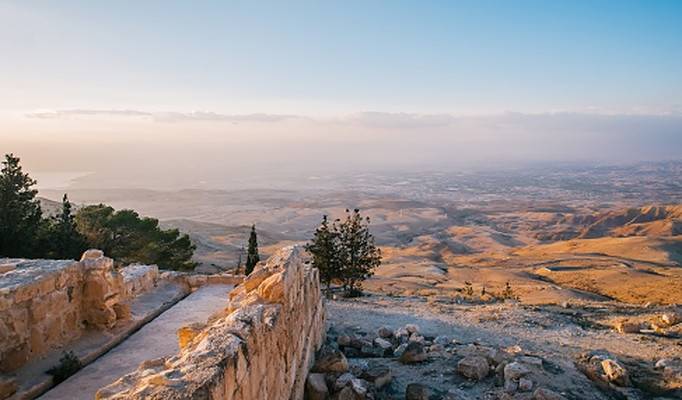
On a clear day, many sites of significance are visible from here, including Jerusalem, Amman, Jericho, the Dead Sea , Biblical Mount Nebo and more.
By Nosson Shulman, Licensed Tour Guide
As we saw last week, Jordan’s best Biblical sites can be experienced WITHOUT ever leaving Israel (to read about the Gilead Mountains & Jabbok River, click here). Today, we will explore a site so important that the Torah (Five Books of Moses) ends with it and the Book of Joshua begins in that area. Of course, I am talking about Mount Nebo!
For the best view, we will head to Mitzpe Yericho, a Jewish Israeli town in Judea and Samaria which has an amazing lookout!
On a clear day, many sites of significance are visible from here, including Jerusalem (Israel’s eternal capital), Amman (Jordan’s capital), Jericho (the first city conquered by the Children of Israel upon entering Israel), the Dead Sea (which is the lowest spot on Earth), Biblical Mount Nebo and more.
The story of Moses ascending Mount Nebo on his last day on earth actually started 40 years earlier with the exodus from Egypt, where the Children of Israel spent 40 years wandering in the desert. The route they travelled encompassed Egypt, Jordan, Eilat (known as Ezion-Geber in the Bible, not part of Biblical Israel) and perhaps Saudi Arabia.
After 40 years the Jews, led by Moses, crossed the Arnon river and conquered the territory of the giant Sihon, who controlled the Ammonite Mountains. They then found themselves just east of the Jordan River, opposite Jericho, in the plains of Moab. The tribe of Reuben asked Moses permission to stay on the eastern side of the Jordan River. Moses reluctantly agreed and gave them the newly conquered territory of Sihon, which included Mount Nebo, as their tribal portion.
On the last day of his life (his 120th birthday) Moses was told by G-d that he was about to die and that he should ascend to the top of Mount Nebo (Deutoronomy 32:49) to see the Land of Israel before he died. Before he ascended, he blessed all of the 12 tribes that were encamped at the plains of Moab.
According to Jewish sources, when it was time for Moses’ soul to depart, G-d did not allow the angel of death to take his soul (as is done with most people). G-d told Moses to lie down and close his eyes, and then He took his soul with a Divine kiss and buried him in an unknown location on Mount Nebo. In Jordan, by Mount Nebo, there is a touristy site called “Tomb of Moses.”
There is actually little validity to this claim; in fact, the Bible says, “No one knows his burial place to this day” (Deuteronomy 34:6).
After Moses died, the Children of Israel mourned 30 days for their beloved leader. After the 30 days, G-d told Joshua (Moses’ successor) to get his troops ready, for in three days they would be crossing the Jordan River.
Three days later, the Children of Israel were about to change world history forever.
Nosson Shulman is a journalist and Licensed Tour Guide in Israel specializing in Biblical tours. To allow tourists to experience Israel during the Corona era, he created the new hit Israel tour video series, which brings Israel to the home of viewers by simulating actual tours. To check out his free sneak preview tour videos, click here. To view sample tour itineraries or to inquire about private tour opportunities with a personalized itinerary on your next trip to Israel, click here.



